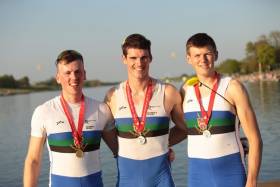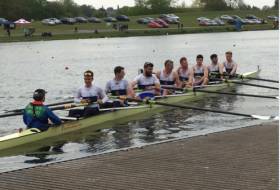Displaying items by tag: Bucs
Gold for Queen's University at BUCS Rowing Regatta
#Rowing: Queen’s University won the Championships Quadruple at the BUCS Regatta in Nottingham today. The crew of Nathan Hull, Sam McKeown, Philip Doyle and Tiernan Oliver beat Reading into second and Oxford Brookes into third. The Queen’s women’s Beginners’ eight took silver in their race.
BUCS Regatta, Nottingham (Selected Results; Irish interest)
Men
Sculling, Quadruple – Championship: 1 Queen’s (N Hull, S McKeown, P Doyle, T Oliver) 6:05.57, 2 Reading 6:08.22, 3 Oxford Brookes 6:10.22.
Women
Eight – Beginners’: 1 Edinburgh 7:15.28, 2 Queen’s 7:24.25.
Queen's in the Medals at BUCS Rowing Regatta
#Rowing: Queen’s University, Belfast, launched a very successful raid on the medals available on the first two days of the BUCS Regatta in Nottingham.
Queen’s had a very successful Saturday. They won the Beginners’ coxed four, and their talented group of scullers also shone. Philip Doyle took silver in the Championship single, while Sam McKeown took fourth. In the intermediate single, Queen’s took gold and silver, through Tiernan Oliver and Nathan Hull.
This foursome were again on song on Sunday. McKeown and Doyle took silver in the Championship double, and Hull and Oliver matched them. Fiona Bell also made the podium in the women’s Championship single scull, taking bronze.
BUCS (British University) Regatta, Nottingham (Selected Results; Irish interest)
Saturday
Men, Four – Beginners’, coxed: 1 Queen’s 7:10.49.
Sculling, Single – Championship: 1 Edinburgh (J Armstrong) 7:20.99, 2 Queen’s (P Doyle) 7:22.01; 4 Queen’s (S McKeown) 7:27.73. Intermediate: 1 Queen’s (T Oliver) 7:37.48, 2 Queen’s (N Hull) 7:37.66.
Sunday
Men, Sculling, Double – Championship: 1 Reading 6:40.76, 2 Queen’s 6:43.56. Inter: 1 Reading 6:55.04, 2 Queen’s 7:00.91.
Women
Sculling, Single – Championship: 1 Edinburgh 8:09.20; 3 Queen’s 8:26.50.
Queen's Take Multiple Medals at BUCS Regatta
#Rowing: Queen’s University, Belfast, had some excellent results at the British University (BUCS) Regatta at Nottingham. Their men’s crews won 11 medals including three golds. The Beginners’ eight and coxed four won, as did Miles Taylor in the men’s intermediate lightweight single sculls. Philip Doyle took silver in the men’s Championship single sculls and Sam McKeown matched this in the men’s intermediate single sculls. Taylor and Chris Beck teamed up to take silver in the Championship lightweight double, and the Championship and Beginners’ quadruples also took silver.































































